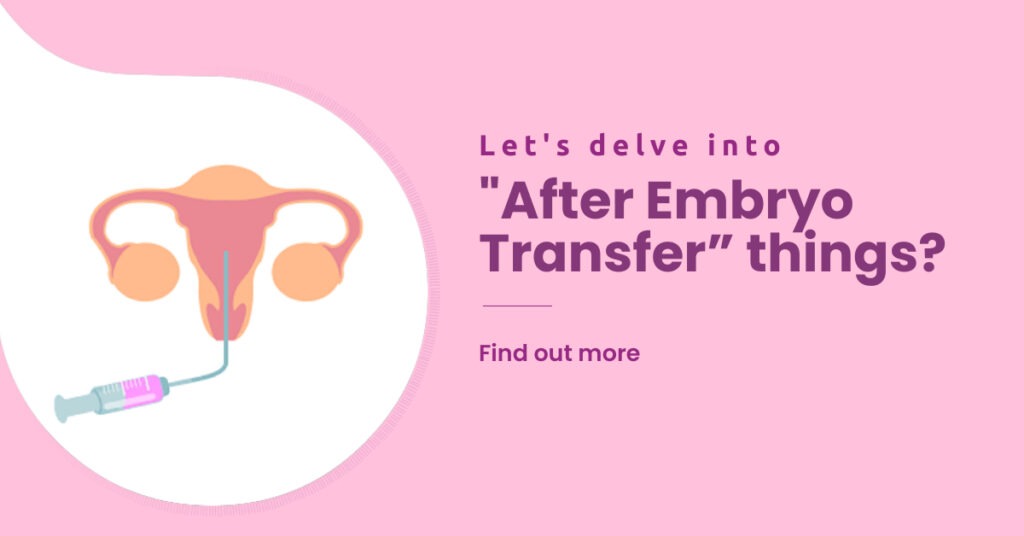Do you want every minute detail about embryo transfer, from its meaning to its symptoms everything? We have gathered detailed information right here.
Embryo Implantation
Embryo implantation to women’s uterus is an important stage in In-vitro fertilization procedure. In-vitro fertilization (IVF) is a procedure whereby insemination is done outside the body in culture dish or test-tube. Subsequently, implantation of embryo in women’s uterus.
Embryo transfer or embryo implantation is the last and crucial step of IVF process. Ovaries are stimulated by giving fertility medication to release healthy eggs. Once the eggs are released, they are retrieved from the ovaries and fertilized with the sperms in test-tube or culture dish. When the embryos are properly fertilized, they are rightly attached to the wall of her womb or uterus later on this stage is called embryo implantation/embryo transfer which is done to begin pregnancy.
In What Cases, Embryos Are Transferred?
- Ovulation disorder – fewer eggs are get-at-able for successful fertilization when ovulation is irregular
- Endometriosis- It is quite painful when the tissue similar to the tissue that normally lines inside of the uterus grows outside the uterus
- Blockage or damaged fallopian tube- when embryos reached to the uterus by passing through the fallopian tube. It would be difficult for the eggs to reach to uterus with damaged or blocked fallopian tube
- Uterine or cervical abnormalities- It is often caused by polyps and fibroids in uterus which can also cause bleeding.
- Hormonal/ genetic disorders- when some genetic orders affect pregnancy
- Sperm problem- when in men, low sperm production, motility of sperm, shape or poor qualities, or damage to testes, then mostly natural fertilization is not possible
When partners are suffering from any of the above conditions, they decide to get IVF treatment or embryo transfer to conceive because it has high success rate. Moreover, there remains no difference between natural conception or IVF.
Before Embryo Transfer:
- At first, the doctor will pick up the best quality of eggs to transfer before 2 or 3 days of embryo transfer
- Numerous processes are available for selection such as metabolomic profiling
- Once the eggs are selected they are placed in the laboratory for fertilization or in culture dish
- Many superior quality eggs are fertilized some are used and surplus are frozen for the further use in future
During Embryo Transfer:
- This process is similar to pap smear whereby doctor will insert speculum into the women’s uterus to keep to vaginal walls open
- Then catheter will be inserted through the cervix into the womb and embryos will be passed through the tube into the uterus
- Doctors use ultrasound to perform this process for placing the embryo at a right place
- Embryo transfer is less invasive process where use of sedation is very rare
- This process is safe and quick
AFTER EMBRYO TRANSFER:
- Have to visit to the doctor to confirm the pregnancy after 2 weeks
- In case you feel any discomfort or unusual symptoms, you always contact doctor in no time
“ Grab a moment to carry a baby inside you for nine months and live that moment till the last breathe”
Precautions: Do’s or Don’ts After Embryo Transfer:
| DO’s | DONT’s |
| Take your prescribes medicines on time | Lifting weight or vigorous activities |
| Pamper yourself and eat healthy diet | Instant pregnancy test |
| Consume folic acid supplements | Have sex |
| Mild yoga and bit of physical activities | Avoid troubling symptoms |
Indications Or Symptoms When Your Embryo Transfer Is Successful:
- Sore breast
- Bloating
- Cramping
- Spotting or bleeding
- Missed period
- Vaginal discharge
- Nausea
- Weakness or tiredness
- Increase need to pee
“Sometimes you feel no symptoms, this doesn’t necessarily mean your embryo transfer is not successful so please do not predict the results too soon. It would be best to perform pregnancy test after 2-3 days of embryo transfer. All the best!”

